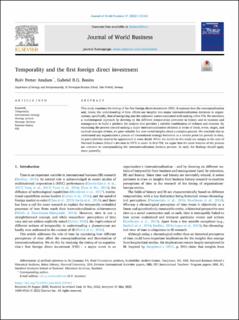Temporality and the first foreign direct investment
Peer reviewed, Journal article
Published version

View/
Date
2022Metadata
Show full item recordCollections
- Scientific articles [2181]
Abstract
This study examines the timing of the first foreign direct investment (FDI). It explores how the conceptualization and, hence, the understanding of time affects our insights into major internationalization decisions in organizations; specifically, that of navigating into the unknown waters associated with making a first FDI. We introduce a multitemporal approach by drawing on the different temporalities prevalent in history and in business and management to build a platform for analysis that provides a suitable combination of richness and contrast. By examining the process toward making a major internationalization decision in terms of clock, event, stages, and cyclical concepts of time, we gain valuable but also varied insights about a complex process. We conclude that to understand any organization's process of international strategy formation at a certain point (or period) in time, its particularities need to be appreciated in some detail. While the details in this study are unique to the case of Harvard Business School's decision in 1971 to make its first FDI, we argue that the main features of the process are common to conceptualizing the internationalization decision process. As such, the findings should apply more generally. Temporality and the first foreign direct investment
